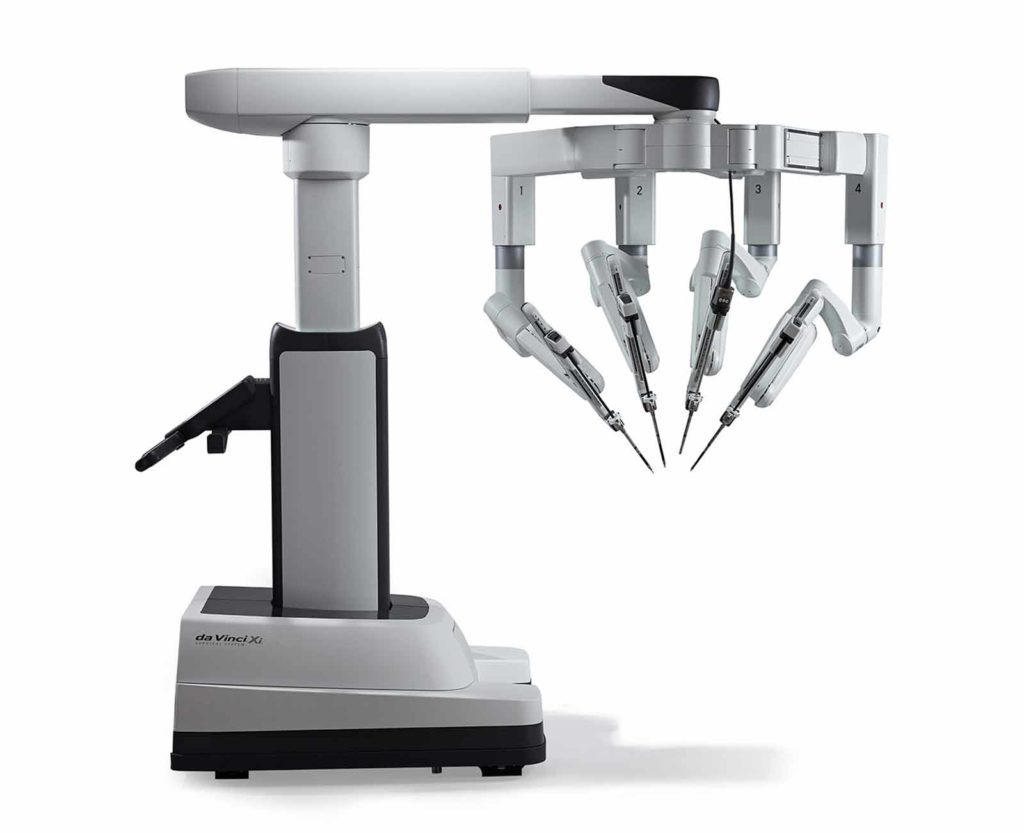Robotic Colorectal Surgery: Smaller Incisions, Less Pain, Faster Healing
Robotic surgery is now widely used across the United States and the Penn State Health system, and the Division of Colon and Rectal Surgery at Penn State Health Milton S. Hershey Medical Center is no exception. Robotic surgery offers many benefits over laparoscopic or open surgery, including smaller incisions, less pain and faster recovery, and current evidence suggests similar outcomes.1
“We try to use it for all our elective procedures to treat diverticulitis, colorectal cancer, Crohn’s disease and ulcerative colitis,” says Dr. Jeffrey Scow, a colorectal surgeon at the Milton S. Hershey Medical Center and an assistant professor of surgery in the Division of Colon and Rectal Surgery.
Advanced Technology and Specialized Experience
Penn State Health uses Intuitive’s most advanced robotic surgery system, the da Vinci Xi. The system offers the latest features, such as a simplified docking procedure, integrated table motion and multi-quadrant access for complex procedures, which makes it more suitable for colorectal surgery than previous models. Some reviewers have deemed it easier to use than previous systems.2
Two highly experienced surgeons, Scow and Dr. Michael Deutsch, regularly perform robotic colorectal surgery here, and both are fellowship trained and board certified in colorectal surgery.
Penn State Health has been performing robotic colorectal surgery for more than seven years. Our faculty members also help train future colorectal surgeons in the use of robotic surgery.
“We have dedicated robotics-trained surgical technicians and nurses, so our whole team is experienced in robotic colorectal surgery,” Scow stated. “We’re committed to growing the program and are excited about the future of this technology.”

During a da Vinci® procedure, the surgeon is 100% in control of the system, which offers high-definition 3D views and translates hand movements into small, precise movements.
Faster Recovery, Similar Outcomes
The procedure itself may take a bit longer, but because robotic surgery uses smaller incisions than laparoscopic or open surgery, the recovery is quicker. Most hospital stays range from three to five days, according to Scow.
“The patients appreciate that they are back at home and back to work more quickly than in years past,” Scow said.
Though the cost of robotic surgery has been the subject of some debate, some recent studies have shown robotic colorectal surgery is comparable to conventional laparoscopic surgery in cost, rates of conversion to open surgery and length of stay.3 Medicare and most insurance will cover robotic colorectal surgery in most cases.
As the technology continues to improve and more long-term results are documented, robotic colorectal surgery will likely become even more widely used.
“We want to stay on top of that evolution and help drive its progress,” Scow says.

Jeffrey Scow, MD
Assistant Professor, Department of Surgery, Division of Colon and Rectal Surgery, Penn State Health Milton S. Hershey Medical Center and Penn State Cancer Institute
Phone: 717-531-4950
Email: mjscow@pennstatehealth.psu.edu
Fellowship: Colon/Rectal Surgery, Mayo Graduate School of Medicine, Rochester, Minn.
Residency: General Surgery, Mayo Graduate School of Medicine, Rochester, Minn.
Medical School: Creighton University School of Medicine, Lincoln, Neb.
Connect with Jeffrey Scow, MD, on Doximity
References:
1. Cheng CL, Rezac C. The role of robotics in colorectal surgery. The BMJ. 2018;360:j5304. Available at ncbi.nlm.nih.gov/pubmed/29440057.
2. Ngu JC, Tsang CB, Koh DC. The da Vinci Xi: A review of its capabilities, versatility, and potential role in robotic colorectal surgery. Robotic Surgery: Research and Reviews. 2017;4:77–85. Available at https://www.ncbi.nlm.nih.gov/pmc/articles/PMC6193435/
3. Vasudevan V, Reusche R, Wallace H, Kaza S. Clinical outcomes and cost-benefit analysis comparing laparoscopic and robotic colorectal surgeries. Surgical Endoscopy. 2016;30(12):5490-5493. Available at https://www.ncbi.nlm.nih.gov/pubmed/27126626

